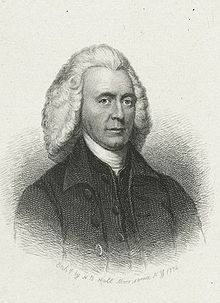
Back إدموند بندلتون Arabic ادموند بندلتون ARZ ادموند پندلتون AZB Edmund Pendleton German Edmund Pendleton Spanish ادموند پندلتون Persian Edmund Pendleton French Edmund Pendleton ID Edmund Pendleton Italian エドモンド・ペンドルトン Japanese
Edmund Pendleton | |
|---|---|
 An 1872 engraving of Pendleton by H.B. Hall | |
| 1st Chief Justice of Virginia | |
| In office December 24, 1788 – October 23, 1803 | |
| Preceded by | Position established |
| Succeeded by | Peter Lyons |
| Governor of Virginia | |
| Acting August 16, 1775 – July 5, 1776 | |
| Preceded by | Position established |
| Succeeded by | Patrick Henry |
| Speaker of the Virginia House of Delegates | |
| In office 1776–1777 | |
| Preceded by | Position established |
| Succeeded by | George Wythe |
| Personal details | |
| Born | September 9, 1721 Caroline County, Colony of Virginia, British America |
| Died | October 23, 1803 (aged 82) Edmundsbury, Caroline County, Virginia, U.S. |
| Resting place | Bruton Parish Episcopal Church Cemetery (Williamsburg, Virginia, U.S.) |
| Nationality | American |
| Political party | Federalist (informally) |
| Spouse(s) | 1st, Elizabeth Roy, 2nd, Sarah Pollard |
| Occupation | Lawyer, judge, delegate to First Continental Congress |
Edmund Pendleton (September 9, 1721 – October 23, 1803) was an American planter, politician, lawyer, and judge. He served in the Virginia legislature before and during the American Revolutionary War, becoming the first speaker of the Virginia House of Delegates (which succeeded the House of Burgesses terminated by Virginia's last colonial Governor, Lord Dunmore). Pendleton attended the First Continental Congress as one of Virginia's delegates alongside George Washington and Patrick Henry, signed the Continental Association, and led the conventions both wherein Virginia declared independence (1776) and adopted the United States Constitution (1788).
Unlike his sometime political rival Henry, Pendleton was a moderate who initially hoped for reconciliation rather than revolt. With Thomas Jefferson and George Wythe, Pendleton revised Virginia's legal code after the break with Britain. To contemporaries, Pendleton may have distinguished himself most as a judge, particularly in the appellate roles in which he spent his final 25 years, including leadership of what is now known as the Supreme Court of Virginia.
On hearing of his death, Congress agreed to wear badges of mourning for 30 days and expressed "their regret that another star is fallen from the splendid constellation of virtue and talents which guided the people of the United States, in their struggle for independence".[1]
- ^ Journal of the House of Representatives of the United States, Gales and Seaton, printers, 1826, p. 427